H o m e | A r c h i v e s | A b o u t | C o n t a c t | B u y a n A d | S u b s c r i b e | O n l i n e A r t G a l l e r y
Contents
Tom Allen:
The Missing Pages
by Steve Ambler
In Hudson
Art and Music Bloom
by Briana Doyle
Village Theatre
Bloodshot Review
by Kathryn Lamb
Pagoda Starling
Drops Magpie Molly
Hudson Film Society
Is in Its 17th Year
by Clint Ward
Red Riding Hood
Panto Review
by Kathryn Lamb
Microbrasserie Cardinal
Brews Live Music and Beer
Arts Hudson
Resumes Publication
by Bert Markgraf
War Memorial Library
Bunker Art Sale
by Kathryn Lamb
Chamber Music
Sords-Duvall
by Steve Ambler
Erica Teaches Music
in St. Lazare
by Bert Markgraf
Chamber Music Series
Dolin Quartet
by Steve Ambler
Canadian Artist Leo Schimanszky
Immortalises Scan
by James Parry
Hudson Chamber Music Series
39th Season
by Steve Ambler
Finnegan's Market
A Eulogy
byKathryn Lamb
Hudson Chamber Music Series
Recital by Lara Deutsch and Adam Cicchillitti
by Steve Ambler
Renovations for Six
A Fun(d) Raising Comedy at Village Theatre
by Kathryn Lamb
Carmen Marie Fabio
Creates Wind Chimes
by James Parry
Hudson Chamber Music Series
Glorious Strings
by Steve Ambler
Puppet Making Workshop for Kids
from the Hudson Players Club
Hudson Chamber Music Series
Lara Deutsch and Adam Cicchillitti
by Steve Ambler
Shows Back at Village Theatre
Strawberries in January
by Kathryn Lamb
Greenwood Activities
Music and StoryFest
Coronicles - 4
Living with COVID
by Art MacDonald
Theatre at Jack Layton Park
Macbeth
by Kathryn Lamb
Theatre at Greenwood
Every Brilliant Thing
by Kathryn Lamb
The Amazing Art of Gardens
and Some Fabulous Painters Who Immortalized Them
by James Parry
Stress and Climate Change
Leo Schimanszky reflects on both
by James Parry
Hudson Film Festival
Available Everywhere in Canada
by Clint Ward
A Story for the Birds
Quite literally!
by James Parry
Hudson Area Artists
Enhance Their Online Presence
by Bert Markgraf
Hudsonite Paul Winstanley's Children's Book
Four Silk Roads
by James Parry
Coronicles - 3
Wrestling Covid to the Ground
by Art MacDonald
The Room Below
Panto Retrospective
by Kathryn Lamb
Doing Theatre Online
During Covid-19
by Kathryn Lamb
Conspicuous Consumption
During COVID-19
by James Parry
Hudson Gallery Plus
Now Online
by Bert Markgraf
Shernya Vininsky
Passion for Horses
by James Parry
Coronicles - 2
COVID, Surfing the Second Wave
by Art MacDonald
Barbara Farren
Our First Nations Sisters and Brothers
by James Parry
Greenwood StoryFest
by Audrey Wall
Hudson Arts Roundup
byKathryn Lamb
Coronicles - 1
Tales from the Great Pandemic
by Art MacDonald
The Amazing Art of Gardens
and Some Fabulous Painters Who Immortalized Them
From Monet to Vincent van Gogh to Kadinsky and each in their unique style
by James Parry, photographs by James Parry - from his garden
'Tis Spring. My favourite season of them all. A time, in the garden, for rebirth and renaissance. With the hope of better, more positive days, ahead. A time when I'm always amazed at the sheer wonder, strength, tenacity, and perennial magic of Mother Nature. With green spikes forcing their way through bare ground or frosted grass. To unfurl, in just weeks, into an array of brightly coloured, often fragrant, leaves and flowers to stimulate and dazzle the senses. Not only for us homosapiens but also the bees, butterflies, and non-gardeners alike.
A time when Crocus pierce unraked leaves and even still-remaining patches of snow and ice. When swaths of Scilla transform green lawns into carpets of blue. Tulips shaft skyward to unfold in all their glory when the warmer weather comes.

Dazzling Daffoldils and Narcissuses, if not exactly to parryphrase William Wordsworth, a crowd, a host of golden daffodils, beside the lake, beneath the trees, fluttering and dancing in the breeze, always a sheer delight. Simple Snowdrops. Fantastic Frittillaria.Fragrant Hyacinths. Ever-faithful Forget-Me-Nots. Pretty blue and pink Pulmonaria considered by the ancient Greeks to be the first sign of a healthy garden. And blue, white and yellow Violets invariably spreading and popping up where you certainly never planted them and least expected.
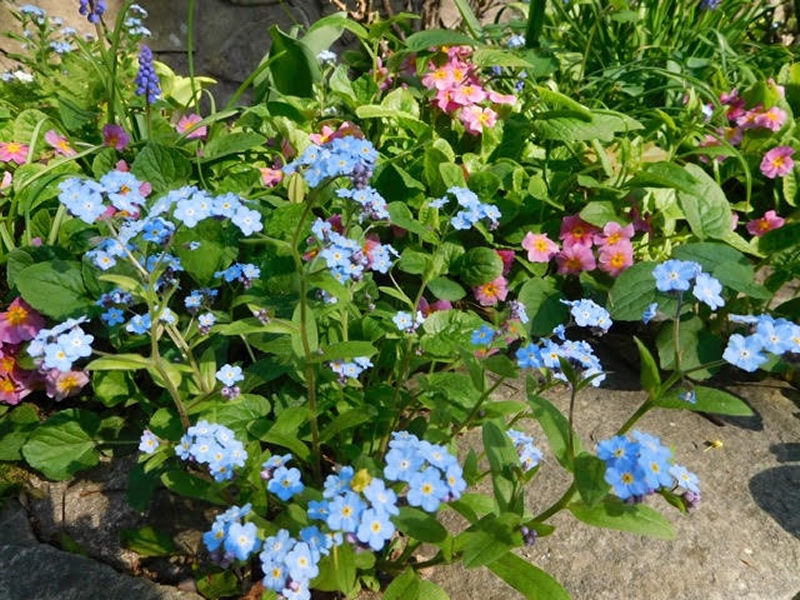
For sure, we gardeners are an optimistic bunch aren't we? Many of us having invested our time, money and energy late last year in acquiring and planting these seemingly insignificant little bulbs that - if all went well and the squirrels and other pesky little critters didn't get them over the Fall and Winter - would not be blooming for another five or six months.
Sure, you are thinking. All sounds pretty and wonderful. But is gardening truly an art? To my mind, at least, without question. For the passionate gardener will always take into account colour, texture, shape, line, composition as well as juxtaposition when designing a garden just as a painter will do when outlining and first drafting their own creation.
It has been said that each seed that is planted is carefully chosen to bring the gardener’s vision to life. Every flower, shrub, and tree is an artistic expression of the planter’s personality. Similarly, a painter’s brush strokes are chosen with intention to capture the beauty that lies within their mind, and perhaps the painter’s garden.
Which brings me to some of the most renowned garden painters of all time. All now passed on but whose works will long be admired and marvelled at for many more springs. Indeed for decades if not centuries to come.
Claude Monet (1840-1926)
Beginning, of course, with Claude Monet who is on record as having once said, “I perhaps owe having become a painter to flowers.” This is certainly visible in his work, much of which depicts great swaths of colorful blooms and for the final 20 years of his life, the main subject he painted was his garden in Giverny, France, where he lived for some 43 years. He planted it with Irises and Chrysanthemums, exotic flowers that were newly introduced to Europe at the time, so that he could paint these colorful beauties from life.
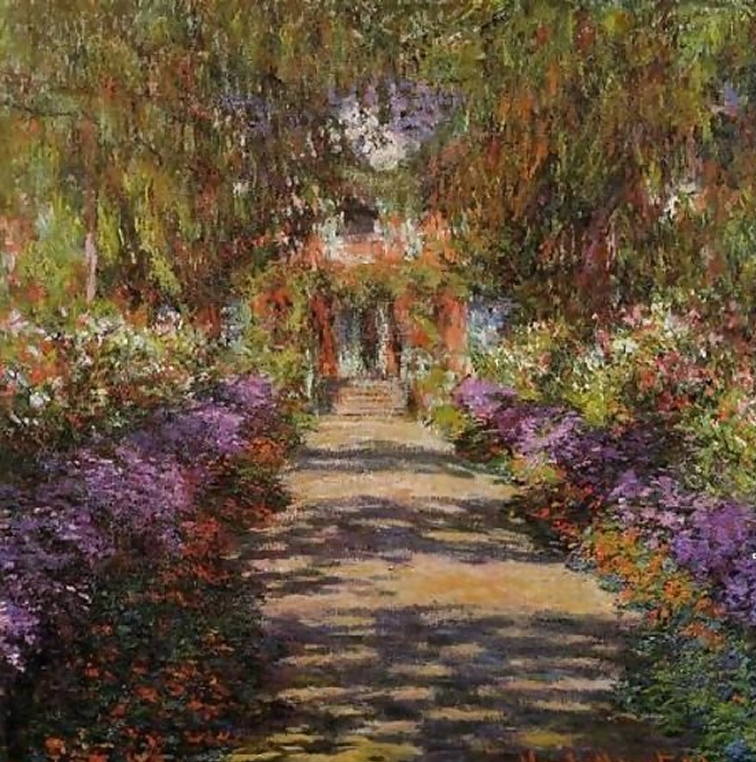
Pathway In Monet's Garden at Giverny
Vincent van Gogh (1853-1890)
Next up, and speaking of Irisis, although Vincent van Gogh wasn’t an avid gardener himself, the gardens he spent time in obviously meant a lot to him and inspired much of his work. Indeed, van Gogh greatly admired the painter Charles-François Daubigny and, after Daubigny died, he traveled to the artist’s home and spent his time painting the expansive garden there which is depicted in so many of his works.
Van Gogh also spent a lot of time in the gardens of Saint Paul Hospital when he was confined to the grounds due to illness. In fact, many of his most famous paintings are of this garden and it is clear that it had a great impact on him. Before choppping off his ear, it is said that he found some solace in the gardens while struggling with severe mental illness, and you can see the peace and comfort the gardens provided him by looking at his depictions of them.
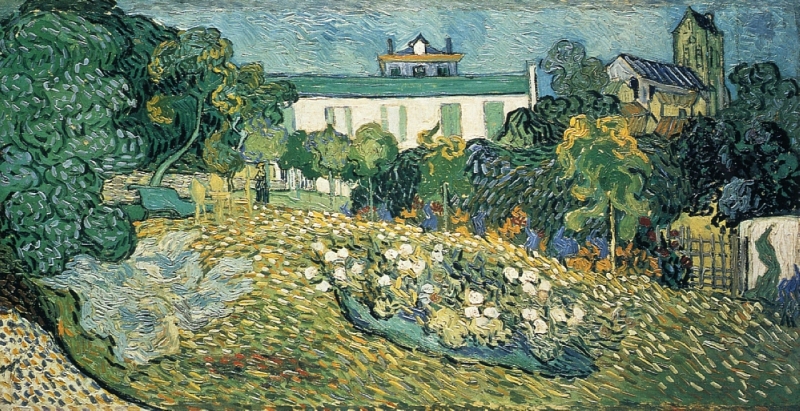
Van Gogh's Daubigny Garden
John Constable (1776-1837)
English Romantic painter, John Constable, was a naturalistic landscape artist. His celebrated painting, Golding Constable’s Flower Garden, portrays a large garden in Suffolk that belonged to his father and hence the name. This very detailed painting expresses long evening dusk, which dull the vibrant borders of flowers his mother had planted. At the time of this painting, John Constable’s parents had passed and this could be the reason for such heavy clouds and mournful shadows, covering the once, colourful garden.
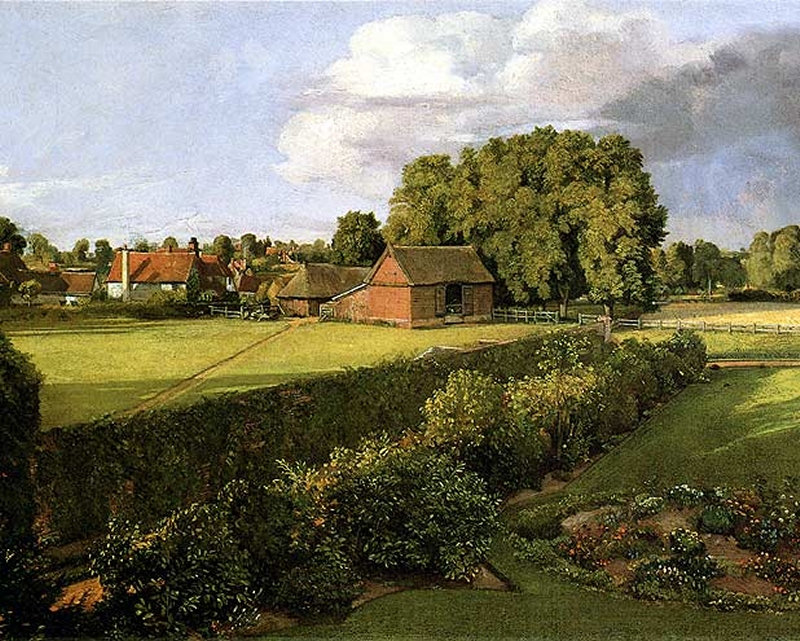
Golding Constable's Flower Garden
Pierre-Auguste Renoir (1841-1919)
French painter, Pierre-Auguste Renoir, who led the development of Impressionism and found great beauty in women was also in love with gardens and natural settings. His Women In a Garden displays two small figures standing in a sea of flowers and shrubbery and with a lack of a horizon, this painting makes the viewer feel encapsulated and captivated by the sheer surroundings.
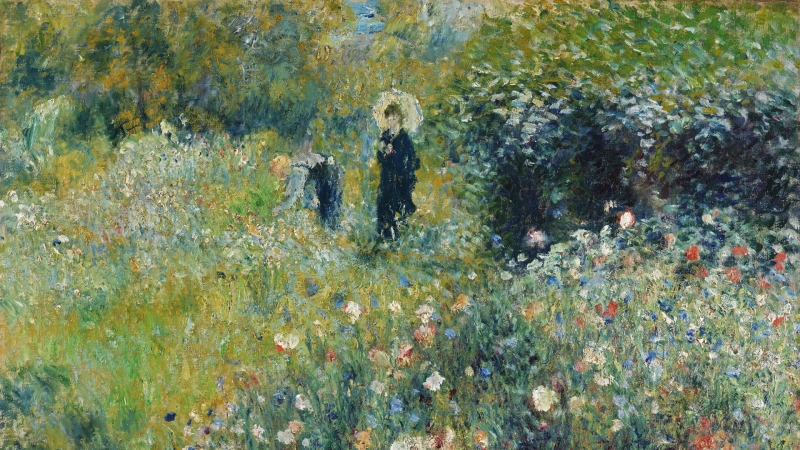
Women In a Garden
Paul Cézanne (1839-1906)
French artist, Paul Cézanne, was a post-impressionist, well known for his recognisable brushstrokes and complex planes of colour and acclaimed as the artist who bridged the gap between Impressionism and Cubism. His painting, The Garden at Les Lauves, is composed of structural blocks of colour which we expect to see in artwork that features buildings but not in natural landscapes and which provides the viewer with a refreshing juxtaposition and more depth than just what can be seen on the surface.
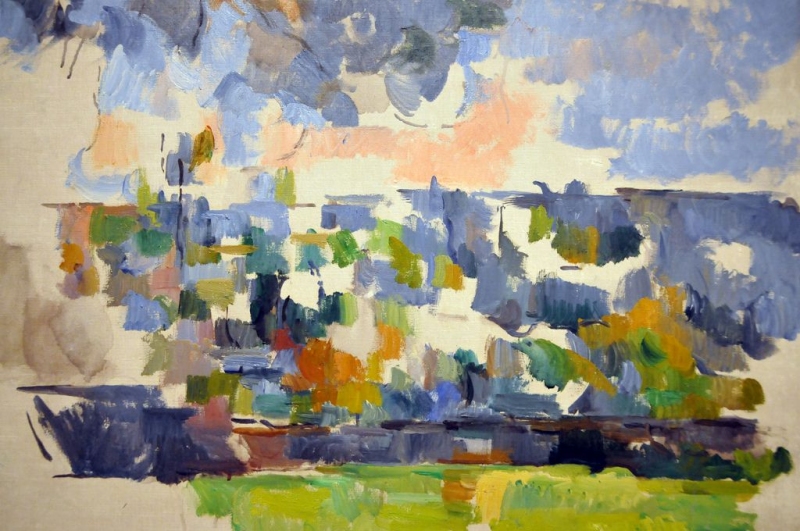
The Garden at Les Lauves
Salvador Dali (1904-1989)
Now he might not be to everyone's artistic taste but, for his part, Spanish Surrealist artist Salvador Dali was inspired by the Gardens of Bomarzo created in the 16th Century in a wooded valley beneath the castle of Orsini in Italy. In particular, the statues of various monsters, which influenced the creatures he painted in The Temptation of Anthony. The sculptures of grotesque animals and monsters covered in moss and tucked behind greenery are extremely surreal, and it is no surprise that the gardens resonated with Dali’s own artistic sense.
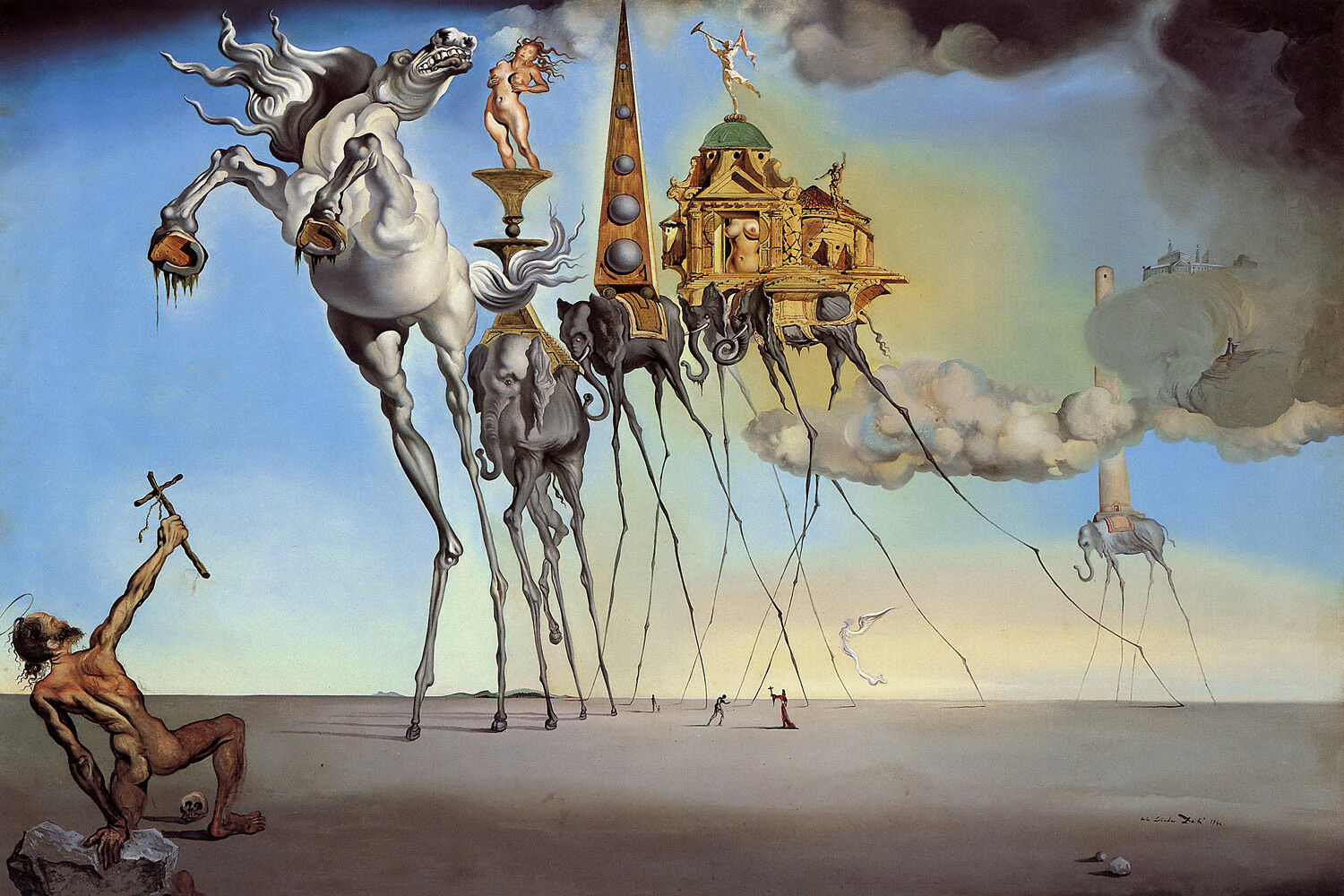
The Temptation of Anthony
Wassily Kandinsky (1866-1944)
And finally, while Russian artist Wassily Kandinsky - considered to be a pioneer in Abstract art - wasn’t one for painting literal gardens, his is known to have been a great inspiration to him and one of his favorite hobbies. The bright colors can be found in his work, and floral forms verging on abstraction appear in some of his paintings. This was very important to him so much so in fact that a series of letters between him and his wife while she was away one summer finds them mostly discussing the progress of the garden including how the lettuce was doing and what Kandinsky had been planting. In fact, the letter focuses much more on gardening than on painting!
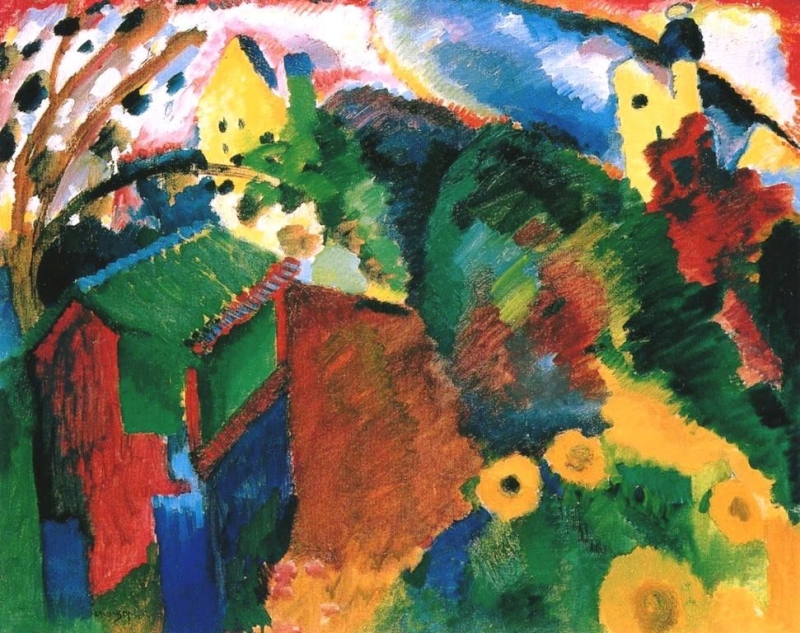
The Gardens at Murnau
As for that Spring Garden pen and ink drawing featured below, well that is one of my own. Inspired by the beauty of nature that surrounds us in our gardens for this, and hopefully, many more years to come!
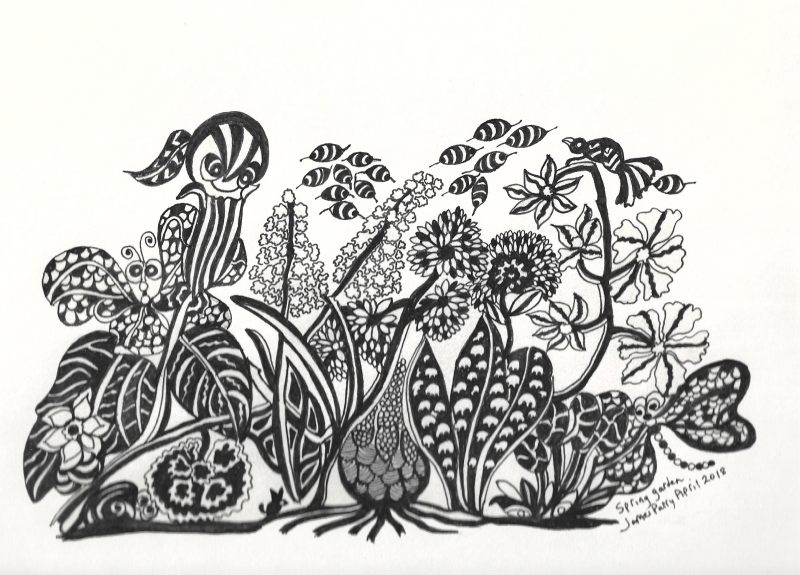
Spring Garden, More of James Parry'sworks can be seen at
Gallery Plus
Below are links to Hudson-related websites:
